
Related
Guests
- Greg Grandinprofessor of Latin American history at New York University. His new book is Kissinger’s Shadow: The Long Reach of America’s Most Controversial Statesman.
Four decades after Henry Kissinger left office, his influence on the national security state can still be widely felt, as the United States engages in declared and undeclared wars across the globe. Kissinger served as national security adviser and secretary of state in the Nixon and Ford administrations and helped revive a militarized version of American exceptionalism. We speak with Greg Grandin, author of the new book, “Kissinger’s Shadow: The Long Reach of America’s Most Controversial Statesman.”
Transcript
AMY GOODMAN: It’s been nearly 40 years since Henry Kissinger left office, but his influence on the national security state can still be widely felt, as the United States engages in declared and undeclared wars across the globe. Kissinger served as national security adviser and secretary of state in the Nixon and Ford administrations, and helped revive a militarized version of American exceptionalism.
During his time in office, Henry Kissinger oversaw a massive expansion of the war in Vietnam and the secret bombings of Laos and Cambodia. In Latin America, declassified documents show how Kissinger secretly intervened across the continent, from Bolivia to Uruguay to Chile to Argentina. In Chile, Kissinger urged President Nixon to take a, quote, “harder line” against the Chile’s democratically elected president, Salvador Allende. On September 11th, 1973, another September 11th, Allende was overthrown by the U.S.-backed general, Augusto Pinochet. In Jakarta, Indonesia, Kissinger and President Gerald Ford met with the Indonesian dictator, General Suharto, to give the go-ahead to invade East Timor, which Indonesia did on December 7, 1975. The Indonesians killed a third of the Timorese population. Kissinger also drew up plans to attack Cuba in the mid-’70s after Fidel Castro sent Cuban forces into Angola to fight forces linked to apartheid South Africa. While human rights activists have long called for Kissinger to be tried for war crimes, he remains a celebrated figure in Washington and beyond.
Joining us now is Greg Grandin, author of the new book, Kissinger’s Shadow: The Long Reach of America’s Most Controversial Statesman. Well, Greg Grandin is a professor of Latin American history at New York University. His previous books include Fordlandia: The Rise and Fall of Henry Ford’s Forgotten Jungle City, The Empire of Necessity: Slavery, Freedom, and Deception in the New World and Empire’s Workshop.
We welcome you back to Democracy Now!, Professor. Greg, why did you take on Kissinger?
GREG GRANDIN: I felt like that, to the large degree, he’s gotten away with it, right? He’s 92 years old, and there’s been a rehabilitation of Henry Kissinger and supposedly what he stands for, not just by the political right, but by the—across the political establishment. Hillary Clinton embraced Kissinger last year in a review in The Washington Post of his last book. Samantha Power went to a Boston Red Sox-Yankee game with him, and they—
AMY GOODMAN: The U.S. ambassador to the United Nations.
GREG GRANDIN: Yeah, liberal hawk, who wrote—who came to—who made her name writing about genocides, including three genocides that Kissinger is implicated in. And they came together at a Yankee-Red Sox game and bantered. I feel like there’s a way in which Kissinger embodies the national security state. Now, let me say, obviously, there’s another critique of Henry Kissinger based on all of the acts—you know, Christopher Hitchens’ famous book, The Trial of Henry Kissinger—and I think that that’s useful, but I think focusing on Kissinger as a war criminal misses the larger—his larger importance in the endurance of the national security state and the continuity, from Cambodia and Vietnam and Laos to Iraq and beyond.
AMY GOODMAN: Explain what you mean. What exactly does it miss?
GREG GRANDIN: Well, I think there’s ways in which Kissinger came to power, took office in 1969 at a very vulnerable moment for the national security state. The old imperial presidency was giving way, was cracking up; that postwar consensus that had governed the country from the 1940s through 1966 was breaking apart as a result of Vietnam, as a result of economic issues and race issues in the United States. And Kissinger was very instrumental in figuring out—not only presiding and, in some ways, accelerating that crackup, because certainly the bombing of Cambodia and all of his—all of his illegal activities, that furthered polarization, hastened the unraveling of that consensus, but I think it was also instrumental in re-establishing the national security state on new footing, in order to move forward in a—to a post-Vietnam War, in three ways in particular.
One, I think that he’s instrumental in re-establishing covert activities and clandestine activities, and figuring out ways to bypass a lot of the focus that reporters, critical reporters, such as yourself and Allan Nairn, and a critical Congress began to place on the presidency. I think you can see a continuity between what he was doing in southern Africa, for instance, supporting—in using third-party mercenaries in order to wage an illegal war, with what comes later under Reagan, Iran-Contra. I think he’s very important in emphasizing the need for spectacular actions in order to demonstrate credibility, but not just credibility to the world, credibility to a war-weary citizen at home. I think him and Nixon are also very good at leveraging domestic dissent and polarization, and using militarism and war in order to—for political gain at home.
So we all know about Nixon’s Southern strategy, an attempt to win over Southern Democrats by playing to racism at home. In some ways, what Nixon and Kissinger did in Laos and Cambodia was the foreign policy of the Southern strategy. Kissinger would go and use the fact that they were bombing a country to destruction to placate, in like blood tribute to, a rising new right, and go to Ronald Reagan as president—as governor of California and said, “Well, look what we’re doing. We wouldn’t have had Laos, we wouldn’t have had Cambodia, if we don’t have Nixon,” as a way of kind of paying tribute to that militaristic right.
AMY GOODMAN: Let’s go to Henry Kissinger in his own words.
HENRY KISSINGER: The average person thinks that morality can be applied as directly to the conduct of states to each other as it can to human relations. That is not always the case, because sometimes statesmen have to choose among evils.
AMY GOODMAN: That’s an archival interview of Henry Kissinger featured in the documentary, The Trials of Henry Kissinger.
GREG GRANDIN: Well, that—quotes like that, when Kissinger is talking about the need to downplay and not use morality or idealism in foreign policy, is often used to mistakenly describe him as a realist or a believer in realpolitik. But one of the things that I argue is that if we take realism as a belief that the material world exists, that the truth of that world is evident in the facts of that world, then Kissinger is not a realist. He comes out of a certain kind of German irrational, kind of will-to-power idealism. He’s very much influenced by German metaphysicists, such as Oswald Spengler, such as Immanuel Kant, that believe that human beings actually don’t have access to reality, that their understanding of reality comes through their action. Now, how that relates to foreign policy is that Kissinger is open—and this is something that he’s been saying since the 1950s forward—that one has to act in the world, that one has to act in the world in order for one to have an understanding of the world, that—he’s told us that great powers are always gaining or losing influence, and then one has to—one has to basically create reality.
AMY GOODMAN: You quote him from 1963. I’m sure you know this quote by heart.
GREG GRANDIN: Yeah. It’s the—well, it’s the epilogue. I don’t know it by heart. You can read.
AMY GOODMAN: “There are two kinds of realists: those who manipulate facts and those who create them. The West requires nothing so much as men able to create their own reality.”
GREG GRANDIN: Yeah. Now just think—fast-forward to the 2000s, and the Bush administration roundly came under criticism when one of its staffers, that is now believed to be Karl Rove, said that “We’re an empire now. When we act, we create reality.” And that was taken as an example of neocon hubris and neocon arrogance, a certain kind of irrational idealism that believes that reality is created through military power. And oftentimes Kissinger is set up as the opposite of that, as a sober realist. But the fact is that he’s not. It’s true that the first generation of neocons—Don Rumsfeld and Dick Cheney and Paul Wolfowitz—came up attacking Kissinger. They thought he was a loser for Vietnam, an appeaser for détente, and a sinner because he didn’t believe in American idealism. But the fact of the matter is that Kissinger kind of lays the groundwork for their extreme subjectivism.
You could see a strong continuity between, for example, Dick Cheney’s “1 percent doctrine,” where he says that we can’t wait for all the evidence to become—we have to treat a 1 percent intelligence as if it was 100 percent certainty, and that’s the justification for why we have a warrant to go into Iraq, to go into Afghanistan, to go into wherever. Kissinger said all of that 40 years ago. And Kissinger—what’s unique about Kissinger is that every other postwar realist—George Kennan, Hans Morgenthau, Arthur Schlesinger—be they liberal or conservative, at some point breaks with national security state, over Vietnam, over the arms buildup. Kissinger, with every lurch to the right, he lurches with it. He moves from Rockefeller, a liberal Republican, to Nixon, in a bat of an eye, from Nixon to Reagan, from Reagan to the neocons. And so, I don’t think that—I don’t think Kissinger creates the national security states, but I think his long career illustrates it and shines a light on it like nobody else.
AMY GOODMAN: Earlier this year, activists with the antiwar group CodePink attempted to perform a citizen’s arrest of Henry Kissinger when he arrived to testify on global security challenges at a Senate Armed Services Committee meeting in January. Let’s go to a clip.
CODEPINK PROTESTERS: Arrest Henry Kissinger for war crimes! Arrest Henry Kissinger for war crimes!
SEN. JOHN McCAIN: The committee will stand in recess until the Capitol police will restore order.
CODEPINK PROTESTERS: Arrest Henry Kissinger for war crimes! Arrest Henry Kissinger for war crimes!
MEDEA BENJAMIN: In the name of the people of Chile, in the name of the people of Vietnam, in the name of the people of East Timor, in the name of people of Cambodia, in the name of the people of Laos.
AMY GOODMAN: Senator John McCain lashed out at the protesters and called on the Capitol Hill police to remove them.
SEN. JOHN McCAIN: I’ve been a member of this committee for many years, and I have never seen anything as disgraceful and outrageous and despicable as the last demonstration that just took place about—you know, you’re going to have to shut up, or I’m going to have you arrested. … Get out of here, you low-life scum.
AMY GOODMAN: So said Senator John McCain. Thirty minutes later, two more members of CodePink interrupted Kissinger’s testimony before the Senate Armed Services Committee.
HENRY KISSINGER: Yet if we look around the world, we encounter upheaval and conflict and chaos.
ALLI McCRACKEN: CodePink calls for the arrest of Henry Kissinger for war crimes. Vietnam: From 1969 to 1973, Kissinger, working for Richard Nixon, oversaw the slaughter in Vietnam, Cambodia and Laos, which led to the deaths of millions—millions of people. Many thousands more died from the effects of massive doses of Agent Orange or from unexploded bombs that cover the countryside.
ANNA KAMINSKI: Chile: Henry Kissinger was one of the principal architects of the coup in Chile on September 11th, 1973, a coup that overthrew the democratically elected government of Salvador Allende.
UNIDENTIFIED: Mr. Chairman, I salute Henry Kissinger for his many—
SEN. JOHN McCAIN: Thank you. Thank you, Doctor.
ANNA KAMINSKI: Sixteen years of repression, torture and death followed.
AMY GOODMAN: The protests at the Senate Armed Services Committee testimony of Henry Kissinger. Greg Grandin?
GREG GRANDIN: Well, just the fact that he’s still being called to give testimony. I mean, you could look at one disaster after another: Cambodia, southern Africa—he instigated counterinsurgencies in Angola and Mozambique that cost the lives of millions of people—what he did in Latin America.
AMY GOODMAN: You have students, so you know when you say, “Well, this is obvious, it’s a long career,” many people really know nothing about this history—
GREG GRANDIN: They know nothing—
AMY GOODMAN: —in Latin America. Explain.
GREG GRANDIN: Well, in Latin America, he supported Operation Condor. He was instrumental in organizing the coup in—not just in Chile, in Bolivia. He was involved in Uruguay and Argentina. He either—you know, he brought a moral legitimacy or he was actually involved in the destabilization campaigns that led to coups. And then, once the region fell to right-wing, anti-communist governments, he was instrumental in supporting Operation Condor, which was a kind of transnational consortium of death squads that carried out a international terrorist campaign.
AMY GOODMAN: That was broader than Chile.
GREG GRANDIN: Yeah, that was broader than Chile. It was broader than Latin America.
AMY GOODMAN: And why did he support Pinochet in the coup against the democratically elected leader, Salvador Allende?
GREG GRANDIN: Well, in general, because Salvador Allende was a Marxist, but he was an elected Marxist and a democratic-elected Marxist. And there’s indication that Allende scared Kissinger more than somebody like Castro did, because Castro kept power not through elections, so he was easily dismissed or contained as a dictator. Kissinger’s fear was that Allende would actually allow for a transference of power, and thus kind of complicate this bipolar world between the Soviet Union and the United States.
AMY GOODMAN: I wanted to go for a moment to another clip. This is a clip of a well-known TV personality who is coming back on the air in just a few days. This is Stephen Colbert, Stephen Colbert who is dancing in Kissinger’s office.
STEPHEN COLBERT: [dancing]
HENRY KISSINGER: Security.
AMY GOODMAN: That was Kissinger calling security. But, of course, it was all a joke.
GREG GRANDIN: Yeah, and I think that’s part of the rehabilitation, the transformation of somebody implicated and responsible, directly or indirectly, in a number of genocides and mass murder, turning into an avuncular kind of comic figure that we can make fun of. I mean, at the same time, people like Samantha Power and Hillary Clinton, they seek out his advice, and they banter with him. And I think it’s—it’s ritualistic. It’s a way of kind of invoking purpose or invoking gravitas. I think that things have gotten so bad in the foreign policy establishment, and things have gotten so bad for U.S. strategy abroad, that there’s a nostalgia for what Kissinger represents. But nobody really quite knows what Kissinger represents. He kind of represents purpose. But what I try to argue in the book is that there’s a hollowness to the purpose, that leads to a circularity, of escalation causing more escalation causing more escalation. And—
AMY GOODMAN: His involvement in Israel-Palestine?
GREG GRANDIN: Well, he was deeply involved in the Middle East, particularly after the U.S. was defeated in Southeast Asia. And he was instrumental in kind of locking in the impasse. There are historians that write about this. Rashid Khalidi talks about how Kissinger kind of locks in the current stalemate. He commits the United States not to recognize Palestine until the Palestinian Authority recognized the legitimacy of Israel, but he doesn’t demand any such—he doesn’t demand any such conditions on the support the U.S. gives to Israel. But beyond Israel-Palestine, his support for the shah, his support for Saudi—
AMY GOODMAN: In Iran.
GREG GRANDIN: In Iran prior to the revolution. Using kind of the duopoly of Iran and Saudi Arabia, Iran prior to the revolution, as guardians of the Gulf was disastrous—Kissinger’s kind of using petrodollars, the increasing rise of oil prices, energy cost, funneling it back into the U.S. defense industry and selling weapons to the shah. Anything he wanted, the shah got. Anything Saudi Arabia wanted, Saudi Arabia got. It’s kind of created the infrastructure of permanent crisis that we see in the Middle East. You know, when we think about the rise of the mujahideen in the 1980s against the Soviet Union, we tend to focus on the CIA’s support for what eventually becomes al-Qaeda. But it’s back in the 1970s where Kissinger urges Pakistan to move into Afghanistan to start to destabilize that country as a way of—as a kind of pawn in the Cold War.
AMY GOODMAN: Do you think Henry Kissinger should be tried as a war criminal? We have 20 seconds.
GREG GRANDIN: Yes, obviously. But I also think that we should also—beyond that, there’s ways in which the language of prosecution and war crimes kind of—kind of eclipse a deeper historical understanding. And if we want to get out of—if we want to understand the mess we’re in now, we have to—beyond just the kind of language of moral outrage and understand Kissinger’s role in rehabilitating the national security state.
AMY GOODMAN: Greg Grandin, I want to thank you for being with us, professor of Latin American history at New York University. His new book, Kissinger’s Shadow: The Long Reach of America’s Most Controversial Statesman.

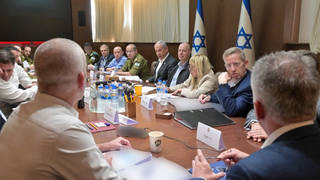
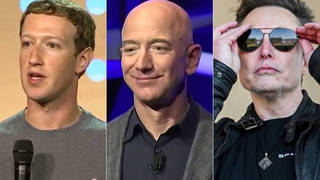
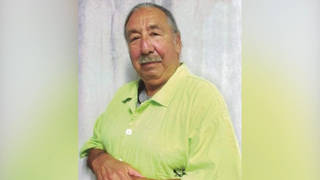
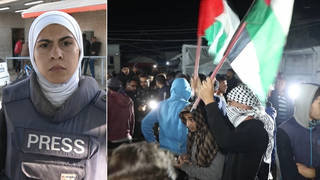





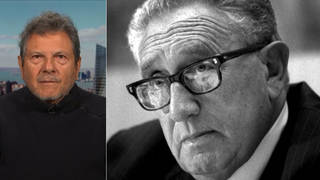
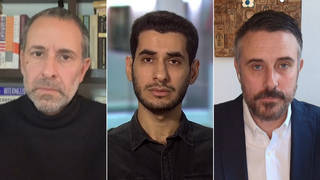
Media Options